
Frederick M. Lawrence Named Dean
| Examining File Sharing and Copyright
Infringement | Contractors in
the Battlefield | Faculty
Bookshelf | Inspiration in Action
| GW Law by the Numbers | Public
Interest Corner | Oral Advocacy Successes
Demonstrate Student Skills | Clinic
Report | Advancing the Dialogue
on Domestic Violence | Emerging Interest
in Animal Welfare | International
Update | GW
Law in History | Faculty
File
Frederick
M. Lawrence Named Dean
Civil rights expert joins the Law School in August
The George Washington University will
welcome Frederick M. Lawrence this fall as he assumes his
new position as dean of the Law School. President Stephen
Joel Trachtenberg announced the appointment in May after
a yearlong search, in which Roger Trangsrud served as interim
dean. Trangsrud, Oswald Symister Colclough Research Professor
of Law, will return to his previous role as associate dean
for academic affairs.
Chosen from more than 175 applicants,
Lawrence “brings to the school a perfect blend of
scholarship and experience, and we look forward to welcoming
him as the leader of the next generation of GW-educated
legal professionals,” Trachtenberg says.
As a graduate of Yale Law School, Lawrence
is a leading expert in civil rights and has written five
books, including Punishing Hate: Bias Crimes Under American
Law. Having served as a delegate to the meeting of
the Organization and Cooperation in Europe on Enactment
and Enforcement of Legislation to Combat Hate-Motivated
Crimes, Lawrence has lectured internationally on the subjects
of bias crime law and civil rights. Since 2003 he also has
served as chair of the National Legal Affairs Committee
of the Anti-Defamation League.
Last year Lawrence testified before Congress
in support of federal hate crimes legislation concerning
Justice Department misconduct in Boston. As an associate
dean for academic affairs and associate dean for Boston
University School of Law, Lawrence also served as a professor
of law, teaching courses on civil procedure, criminal law,
civil rights enforcement and civil rights crimes. Lawrence
received Boston University’s Metcalf Award for Excellence
in Teaching in 1996, the university’s highest honor
in teaching.
“He is an internationally known
scholar and an extraordinary teacher, and he has been a
respected leader at Boston University School of Law. He
has the energy, vision, and experience to reach out to our
large and supportive alumni community and to work well with
our dedicated senior staff. I am confident that Dean Lawrence
will have enormous success building upon the strong foundation
laid down by former GW Deans Barron, Friedenthal, and Young
over the last two decades, and that he will guide GW Law
to new levels of excellence,” Trangsrud says.
Having other interests outside of legal
studies and civil rights, Lawrence will be at home in Washington,
as he has performed with the New York Choral Society at
the Kennedy Center for the Performing Arts, as well as at
Carnegie Hall and Lincoln Center.
“I am delighted at the prospect
both of becoming dean of The George Washington University
Law School and of joining the faculty of the school. The
George Washington Law School has a long and illustrious
history in the District of Columbia and in the American
legal academy,” Lawrence says. “It has become
one of the top law schools in the country, with a distinguished
faculty and staff, an impressive student body, and a highly
accomplished group of alumni. I am honored to be joining
the George Washington community.”
Examining
File Sharing and Copyright Infringement
Only hours after oral arguments concluded
before the U.S. Supreme Court in Metro-Goldwyn-Mayer
Studios Inc., et al., v. Grokster, Ltd. on March 29,
a number of the participating counsel visited GW Law for
a standing-room-only panel discussion on the copyright issues
raised by the litigation. The panel came fast on the heels
of a visit to the Law School by Dan Glickman, JD ’69,
who is president and CEO of the Motion Picture Association
of America and a former secretary of Agriculture and congressman
from Kansas. Glickman spoke on the growing dangers posed
by file sharing to the motion picture industry and took
time for audience questions.
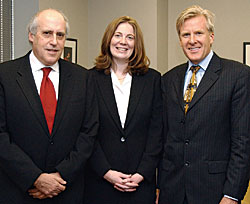
MPAA CEO Dan Glickman, JD ’69,
former president of the Student Intellectual Property
Law Association Sally Parker, and associate professor
Robert Brauneis
Photo by Claire Duggan |
At issue in the case is whether entities
that offer software that allow users to trade files over
the Internet are liable for any copyright infringement in
which those users engage. The Court, in the 1984 case Sony
Corporation of America v. Universal City Studios, Inc.,
held that manufacturers of video tape recorders could not
be held liable for contributing to copyright infringement
committed by the machines’ users if there were “substantial
noninfringing uses” for the machines. The Grokster
case considers how to apply this standard for “peer-to-peer”
file sharing technology.
The panel featured Thomas J. Perrelli
of Jenner & Block, who represented the petitioners;
Hon. Marybeth Peters, JD ’71, register of copyrights;
professor James Gibson of the University of Richmond School
of Law; and professor Justin Hughes of Yeshiva University’s
Cardozo School of Law, all of whom filed amicus briefs supporting
the petitioners. The respondents were represented by Cindy
Cohn of the Electronic Frontier Foundation, Michael Page
of Keker & Van Nest, and professor Michael Birnhack
of the University of Haifa Faculty of Law. The panel was
moderated by associate professor Robert Brauneis, co-director
of GW Law’s Intellectual Property Law Program. The
event was co-sponsored by The District of Columbia Bar Arts,
Entertainment, Media, and Sports Law Section and the Washington
chapter of the Copyright Society of the USA.
The spirited discussion, which included
reflections on the morning’s oral arguments and a
fair amount of crystal-ball gazing, played out before an
active audience of practitioners, students, and professors,
many of whom contributed pointed questions and opinions
to the debate. The Court’s opinion in the case is
expected in June.
—Laura Heymann, visiting associate
professor
To read more about Dan Glickman,
JD, ’69, call up his GW Magazine profile
in the article titled “The Entertainers” in
the spring 2005 edition at www.gwmagazine.com.
Contractors
in the Battlefield
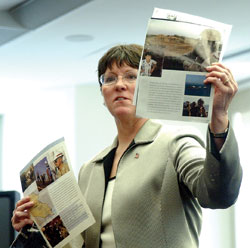
Deidre A. Lee, director of Defense
Procurement and Acquisition Policy for the Department
of Defense, delivered the keynote speech of the conference.
Photo by Claire Duggan |
With support from the International Peace
Operations Association, GW Law hosted a daylong conference
in January on the employment of private contractors in the
U.S. military. With additional support from Institute for
Global and International Studies and the Security Policy
Studies Program of GW’s Elliott School of International
Affairs, three panels were held, in addition to luncheon
and keynote address by Deidre Lee, director of defense procurement
at the Department of Defense.
Topics included contract management, the
structure of the contracting industry and the proper role
for contractors, and the legal issues and liabilities surrounding
what has been learned from the continuing conflict in Iraq.
Both legal and operational issues relating to the integration
of contractors on the actual battlefield were discussed,
in addition to the relation and obligation of the U.S. government
to contractors positioned in areas. Individuals from organizations
including the Center for Public Integrity, the United States
Army Training and Doctrine Command, International Committee
of the Red Cross, and the United States Senate Armed Services
Committee contributed to the panel discussions.
—Erin Mavian
|
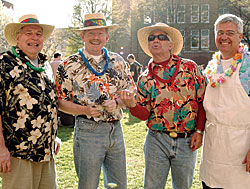
Photo by Claire Duggan |
Giving the
Beach Boys a run for their money, senior associate
dean for administrative affairs Tom Morrison, interim
dean Roger Trangsrud, professor Eric Sirulnik, and
executive director of law advancement Rich Collins
get into the spirit of a GW Law tradition: Deans
Jeans Day. Students enjoyed an afternoon of sunshine,
barbecue, and the sight of faculty members and administrators
sporting Hawaiian shirts, leis, and straw hats on
April 13.
|
Inspiration
in Action
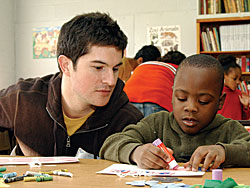 |
GW Law student Christopher Jardine volunteered
at a community center in honor of Martin Luther
King Day alongside law students from D.C. universities.
Photo by Claire Duggan
|
In honor of Martin Luther King Jr., who
encouraged Americans to come together to create stronger
communities, law students at several Washington universities
volunteered in January for the D.C. Inter-Law School Service
Project. About 35 students from GW Law School, American
University College of Law, Georgetown Law School, Howard
University Law School, and University of the District of
Columbia Law School took on service projects at the Johenning
Baptist Community Center in southwest D.C.
“It was inspiring to work with a
gang of such compassionate D.C. area law students,”
said Christopher Jardine, a GW Law student who hopes to
volunteer again next year.
The majority of the morning was spent
clearing and cleaning the center with local residents and
center employees as classrooms and playrooms were scrubbed,
swept, and organized. Lessons that focused on civil rights
and equality were taught later in the day as the afternoon
was dedicated to the children of the community.
Three separate sessions were taught by
the law students, which included the history of civil rights
and the civil rights movement, freedom songs and their meanings,
and understanding cultural diversity and community service
in addition to the role they play in our lives. The group
plans to return to the center again next year.
—EM
GW Law
By the Numbers
• In its annual “America’s
Best Graduate Schools” issue, released in April, U.S.
News & World Report ranked GW Law School 20th out
of 179 accredited law schools in the nation. GW Law’s
intellectual property program was named third best in the
country; its international law program was ranked ninth;
its environmental law program was ranked 10th; its clinical
training program ranked 13th; and its tax law program ranked
24th.
• In a new study on the success
of different law schools in placing their graduates at the
nation’s most elite law firms, GW is ranked 15th in
the country. The placement is just slightly behind University
of California at Berkeley, tied with Vanderbilt, and ahead
of Northwestern. The list can be viewed at http://leiterreports.typepad.com/blog/2005/03/new_study_of_na.html.
• In a list of top-50 authors in
the Social Science Research Network’s top-1,000 author
list, professor Orin Kerr is listed 10th, professor Steve
Schooner is 39th, and professor Daniel Solove is 41st. The
list is measured by downloads of all the papers in the SSRN
eLibrary in the last 12 months through March 1, 2005.
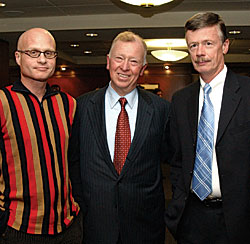
Photo by Claire Duggan |
Harvey
J. Goldschmid, commissioner of the U.S. Securities
and Exchange Commission, delivered the 25th Annual
Manuel F. Cohen Memorial Lecture March 23 in the
Jacob Burns Moot Court Room. Here, he is joined
by professor Lawrence Mitchell and Peter Raven-Hansen,
senior associate dean for academic affairs.
|
Oral Advocacy
Successes Demonstrate Student Skills
GW Law students represented their school
well this academic year, building on past successes in traditional
competitions and blazing trails in new contests. These are
a few of their highlights:
ADR
First-year students Peter Bazos and Vivian
Basdekis were runners-up in the fall 2004 ABA Regional Negotiations
Competition hosted by GW Law; 24 teams from two countries
competed. Second-year student Adelicia Cliffe Taylor coached
the duo as they advanced to the nationals in Salt Lake City.
After tying for second at the Regional
Client Counseling Competition Feb. 19 at the University
of Baltimore School of Law, Adelicia Cliffe Taylor and Valerie
Schneider, both 2Ls, were invited to the nationals at Chapman
University School of Law in Orange, Calif., in March.
This spring, 2Ls Julia Kreyskop and Jeffrey
Showalter placed second in the Regional Mediation Competition.
Mock Trial
Fernando Brito, 2L; Orlando Juarez, 3L;
Denise Noel, 3L; and Joe Orzano, 2L; reached the semifinal
round of fall 2004’s National White Collar Crime Mock
Trial Tournament, sponsored by Georgetown University.
Moot Court
Kristie Blase and Lynn Deavers, both 2Ls,
won the National Center for Animal Law Moot Court Competition
at Harvard this spring. Deavers was named best oralist.
3Ls Leigh Anne DeWine, Lindsay Kay, James
Menz and David Shull won Best Memorial (Brief) First Place
at the Philip C. Jessup International Law Moot Court Mid-Atlantic
Regional Competition this spring.
Third-year students James Cobb and Stephanie
Roy won best brief out of 36 teams at the ABA National Appellate
Advocacy Competition Regional and advanced to the nationals
in Chicago in April. Don Amlin and Frank Scaduto, both 3Ls,
won third best brief and also advanced to the nationals.
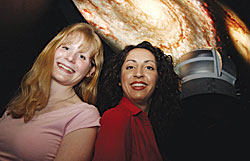
Kristie Blase, 2L, and Olivia Hussey,
3L, winners of the North American Regional of the
Manfred Lachs Space Moot Court Competition
Photo by Claire Duggan |
On April 12, Judge Herman Gierke of the
U.S. Court of Appeals for the Armed Services held a special
session in GW Law’s Moot Court Room to hear oral argument
in the case of United States v. Garlick. After hearing from
attorneys for each side, the court invited students David
Hartnagel, 3L, and Melissa Covolesky, 2L, to present amicus
briefs and oral argument on behalf of each side.
Second-year student Adrian Esguerra won
third place for oral advocacy in the Hispanic National Bar
Association’s 10th Annual Moot Court Competition.
Sheree Clove and Christl Denecke, both
3Ls, were the runners-up in the Regional Giles Rich Intellectual
Property Moot Court Competition in Boston, advancing to
the nationals in D.C.
David Hartnagel, Samuel McDonald, Daniel
Nadel, all 3Ls, and Brendon Tavelli, a 2L, placed second
at the Niagara Moot Court Competition at the University
of Windsor, Ontario, Canada. The competition was organized
by the U.S.-Canada Law Institute, Case Western, and focused
on relations between the two nations.
Olivia Hussey, 3L, and Kristie Blase,
2L, won the North American Regional of the Manfred Lachs
Space Moot Court Competition this spring and were invited
by NASA to Fukuoka, Japan, to compete in the world semi-final
in October.
Of Note
Denise Starr, 3L, won the first Animal
Law Legislative Drafting and Lobbying Competition in Washington.
Advancing
the Dialogue on Domestic Violence
New legal ground was broken in March as
the U.S. Supreme Court heard Town of Castle Rock, Colorado
v. Jessica Gonzales, the first domestic violence case
to reach the Supreme Court.
The background of the case drew much media
attention, including a 60 Minutes segment about
the story earlier this year, and a Washington Post
opinion article by Professor Joan Meier.
The case concerned Jessica Gonzales, whose
three daughters were killed by her husband. Gonzeles alleged
that police failure to enforce her restraining order when
her husband snatched the children deprived her of due process
under the 14th Amendment. Meier, director of GW Law’s
Domestic Violence Project (a course for credit), and the
Domestic Violence Legal Empowerment and Appeals Project
(an affiliated nonprofit), and several of her students worked
with Richard Smith of McDermott, Will & Emery to file
an amicus brief on behalf of five police organizations supporting
Gonzales. The facts are as follows:
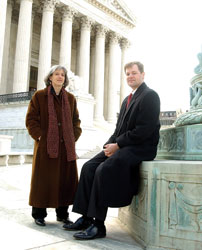
Professor Joan Meier and McDermott,
Will & Emery attorney Richard Smith
Photo by Claire Duggan |
In May 1999, Gonzales secured a restraining
order; in violation of the order’s terms, Simon Gonzales
abducted the girls on the evening of June 22, 1999, according
to Gonzales’ complaint. Gonzales immediately made
five calls to the police department and met with law enforcement
officers twice, seeking to have her protection order enforced
and her children returned. Police repeatedly told her to
“call back later,” even after she confirmed
that the girls were with her husband.
At 1 a.m., in desperation, Gonzalez went
to the police station and filed an incident report. The
officer took no further action, and went to dinner. At 3:20
a.m., Simon Gonzales arrived at the station in his truck.
He got out and opened fire on the station with a semi-automatic
handgun, and was mortally shot at the scene. The bodies
of the Gonzales girls were found in the cab of the truck.
They had been murdered by their father.
Gonzales’ attorney filed a lawsuit
against the police department and the town, charging violations
of the due process guarantees of the 14th Amendment. Both
the Colorado district court and the 10th Circuit rejected
the substantive due process claim citing a 1989 Supreme
Court ruling, DeShaney v. Winnebago County Department
of Social Services, 489 U.S. 189, in which the Court
held (5-4) that there was no substantive due process violation
where a child was beaten into permanent brain damage by
his father, because the Constitution does not require the
government to protect an individual from private violence.
However, the 10th Circuit ruled in Gonzales’ favor
on the procedural due process claim, holding that her statutory
right to mandatory enforcement of her protection order was
a “property interest” that could not be abridged
without fair process. The court found that the police department’s
inaction constituted an arbitrary denial of procedural due
process.
The question put before the Supreme Court
was whether the constitutional guarantee of procedural due
process was violated by the Castle Rock police department’s
failure to enforce the protection order, in violation of
the state statute, which required them to use “every
reasonable means” to do so.
DV LEAP and Gonzales’ attorney,
Brian J. Reichel, argued that the mandatory arrest statute,
coupled with the individualized protection order, created
a concrete state “benefit” that was entitled
to procedural due process before it was denied.
“Colorado has the strongest possible
state law to protect victims of domestic violence, which
creates a concrete, tangible benefit for holders of restraining
orders. The long line of cases requiring due process for
the denial of lesser benefits such as welfare, employment,
and school attendance, should apply equally here,”
Meier says.
To rebut the city’s argument that
it is unduly burdensome to meet the requirements of due
process in responding to protection order violations, Meier
and Smith’s amicus brief detailed more than two dozen
“best practices” in police departments across
the United States that are more demanding than the minimal
requirements of procedural due process delineated by the
10th Circuit.
Meier found out about the case through
the national domestic violence attorneys’ listserv
(created by Robin Runge, JD ’97, executive director
of the ABA Commission on Domestic Violence) and recruited
Smith and his firm’s pro bono services through DV
LEAP. (The firm’s managing partner, Timothy Waters,
recently joined DV LEAP’s Board.) In addition to DV
LEAP’s brief on behalf of several police organizations,
a vast array of domestic violence and other organizations
filed amicus briefs on the mother’s behalf.
Lara Worm, who worked on the case with
Meier during her first year at GW Law and will continue
in the fall, says the case represents a watershed moment
in the legal world. “We have come far enough in society
that there would be a domestic violence issue before the
Supreme Court, when most people used to look the other way,”
Worm says.
As this article went to press, the Supreme
Court issued a 7-2 decision reversing the 10th Circuit and
holding that Gonzales could not sue under the 14th Amendment
for the police failures to enforce her order despite the
mandatory arrest law. Meier’s reaction was swift:
“While I am disappointed that the Supreme Court has
not recognized that mandatory arrest laws mean what they
say, and that battered women have a right to minimal fair
treatment by the police, I am not surprised, given the conservative
inclination of this Court. However, many police departments
have been and will continue to use proactive and protective
measures to protect victims of domestic violence. For the
others, state laws and constitutions still provide meaningful
avenues for holding police accountable; domestic violence
advocates will be turning our attention in this direction
in the future.”
While acknowledging that the case presented
a novel legal theory for the Court to review, Smith says
that despite the outcome, he is pleased the case brought
important issues to light. Smith’s efforts have not
gone unnoticed; he was awarded the McDermott Will &
Emery Award for Outstanding Achievement and Commitment to
Pro Bono in Service to the Community. The firm was awarded
the D.C. Bar’s Pro Bono Award for its work on this
case and other matters.
“It was a true pleasure to
work on this important project with Professor Meier, DV
LEAP, and the law school students at GW,” Smith says.
“Through initiatives like DV LEAP, which brings the
resources and talent of top-tier law firms to bear on difficult
legal issues, we can make a difference.”
—Laura Ewald
Emerging
Interest in Animal Welfare
The spring semester marked the beginning
of the second year of the Animal Welfare Project at GW Law
School, which has grown increasingly effective during its
sophomore year. Notably, the GW/HSUS Animal Law Litigation
Project, a joint venture with the Humane Society of the
United States, gives students practical experience standing
up for animal rights in the nation’s courts.
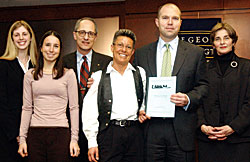
Second-year students Lynn Deavers
and Kerry Contini, D.C. Dept. of Health Director Gregg
A. Pane, professor Joan Schaffner, D.C. Councilmember
David Catania, and professor Mary Cheh during the
February press conference in which the Animal Welfare
Project released a report on animal welfare in the
District.
Photo by Claire Duggan |
The venture is one of the first of its
kind in the country. “This unique program, combined
with the many other opportunities here for students interested
in animal protection, places GW Law at the cutting edge
of law schools in this up-and-coming area of law,”
says GW Law School Interim Dean Roger Trangsrud.
Jonathan Lovvorn, vice president of animal
protection litigation for HSUS and an adjunct faculty member
at GW Law, led the project. He and his wife, Nancy Perry,
have taught the Animal Law and Wildlife Protection Seminar
at GW Law for three years.
In February, the Animal Welfare Project
released “A Report on Animal Welfare in the District
of Columbia,” which provides proposals to improve
the lives of animals in Washington. More than 50 students,
together with professors Joan Schaffner and Mary Cheh, spent
a year researching laws and compiling data for the report.
“It’s a unique document,”
Cheh says. “We have taken a comprehensive look at
the various animal populations in the District. We hope
it will be a model for other law schools and that it will
encourage legal initiatives in local jurisdictions across
the country.”
On hand to receive the report on behalf
of the District was D.C. Councilmember David Catania and
Department of Health Director Dr. Gregg A. Pane. Both officials
said they were impressed with the report and are interested
in speaking with the group further on the issue of a task
force.
Of other accomplishments, Schaffner says,
“I am extremely proud of our students’ efforts
this year in creating a GW Law student chapter of the Animal
Legal Defense Fund, placing first in the National Animal
Law Moot Court Competition at Harvard Law School, and winning
the first Animal Law Legislative Drafting and Lobbying Competition
hosted at GW Law.”
Second-year students Lynn Deavers and
Kristie Blase were named the top team at the NCAL’s
Animal Advocacy Moot Court Competition at Harvard, besting
19 other teams. Deavers was named Best Oral Advocate. This
year’s competition dealt with the term “cruelty-free”
as well as issues of false advertising and unfair competition
laws.
—Claire Duggan